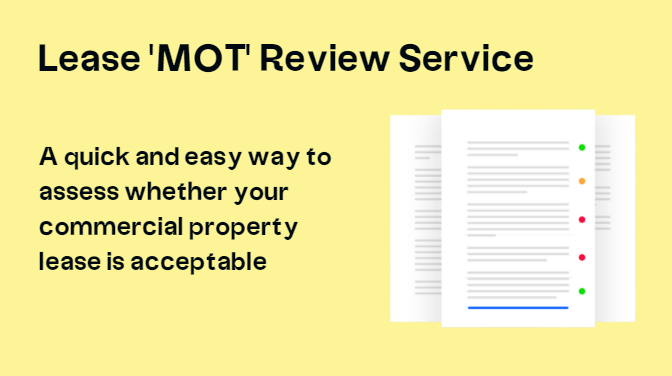Are you a business owner looking for a new location or have you identified premises and are considering the next step? Negotiating a commercial lease can provide many benefits to a business and mitigate risks, if done correctly.
Here we consider:
Are commercial leases negotiable?
In short, yes, commercial leases are negotiable. However, the extent of a tenant’s ability to do this does very much depend on a number of factors. Key to this is the relative bargaining power of the parties.
A tenant may wish to consider what leverage they have by taking into account:
- The local market – is it buoyant or are properties remaining on the market for a long time before being let? Are there alternative properties available which would suit the requirements?
- The nature of the property you wish to take on – is it part of a large popular development or is it a less ‘trendy’ building that may have been empty for some time?
- What is the size of your business and how does this relate to the landlord’s business or their property portfolio? If you are a ‘good catch’ as a tenant, this may go a long way.
It is useful preparation before entering into negotiations to research the local market, understand who the landlord is, have discussions with various property agents and engage appropriate advisors, such as solicitors and surveyors.
How much can you realistically negotiate on commercial leases?
How much is up for grabs on the negotiating table does depend on the factors noted above.
Preparing for the negotiation is key. A tenant should understand what their objectives are. Common areas for negotiation are:
- Rent free periods / reduced rent period – This is where the landlord incentivises the tenant to enter into the lease by agreeing that rent will not by due for a specified period (normally a number of months to a year) or it will be at a reduced rate.
- Any rent reviews – A tenant should be sure to understand the impact of rent reviews. There are various types of rent review mechanism (they can be fixed increases; they can be linked to a certain index, such as the Retail Prices Index; or they can be by comparison to the open market). It may be prudent for a tenant to try to agree a cap on any potential increase at a rent review so as to ensure the rent will not jump to an unsustainable amount in the future.
- Early break provisions – Break provisions allow a party to terminate the lease early. This can be important if your business wants flexibility as a business’s circumstances often change and a tenant may not need the space for as long a period as they had originally envisaged.
- The parties’ responsibilities for repairing the property – A tenant may assume that the landlord is responsible for major repairs as they own the property, but this is often not the case. You should ensure that you understand your obligations and that they are balanced. The landlord will invariably try to pass on all responsibility to the tenant but may be prepared to revise their position if pushed. If the tenant is to repair the whole property (including the structure) it would be prudent to try to limit this obligation to a schedule of condition (so that the tenant doesn’t have to put property into any better state of repair than at the start of the lease). Alternatively, if the landlord is to repair the building and recover the cost through a service charge, a prudent tenant should look to try and place a cap on the service charge so that it is not subject to huge charges it had not previously anticipated.
- Will the landlord require any form of guarantee? – This may not be offered at the outset and specific advice should be taken, but the landlord may require a third party to stand as guarantor for the tenant’s obligations, or it may insist on a rent deposit (which could be problematic for a tenant’s cashflow). If either of these are agreed, then a prudent tenant may wish to negotiate that they are released after certain conditions have been met which provide sufficient comfort to the landlord that the tenant is financially strong enough to continue to pay the rent.
- How long will the term of the lease be and is it anticipated that the tenant will have a right to remain in the property at the end of the term and insist on a new lease (known as security of tenure)? – The term of the lease also sets the context for many other obligations: what is reasonable in a long lease may not be so reasonable in a short lease. Determining what is appropriate depends on your business objectives.
There may be some areas that are not strictly speaking items of negotiation, but more of practical, factual significance. This includes matters such as:
- The VAT status and whether the landlord has ‘opted to tax’ on the property. If this is the case, then the tenant will be required to pay VAT on the rent. Many businesses are able to recover VAT so this may not be a big issue. However it could impact on cashflow and will certainly be an issue if the tenant is not able to recover VAT. VAT will also increase the stamp duty that may also be payable. You should ensure that you seek appropriate accountancy advice on tax related matters.
- Understanding the landlord’s costs. Some landlords seek a contribution to their costs from the tenant. This is not mandatory and, from a tenant’s perspective, should be resisted in the current market. If it is agreed, the tenant’s solicitors will ordinarily be required at the outset of the matter to give an undertaking for these costs (a solicitors’ promise to pay them). In giving this undertaking, your solicitor will likely require that you provide them with these funds on account. The scope of the undertaking given and any agreement with the landlord concerning payment of their costs is a very important consideration – it can impact significantly on their approach to negotiations (the less risk they have for wasted costs, the more prepared they may be to see a transaction fall down – meaning they will often take a more aggressive stance in terms of negotiation).
- In addition to engaging solicitors and accountants, you should also look to take advice from a surveyor. One way or another it is likely you will be responsible for the repair of the building, whether it be by direct obligation to repair, or by way of a service charge contribution. Therefore, it is important that you are comfortable that the building is in good repair. If there is disrepair to the property, this may be something that you wish to pick up with the landlord and require them to fix certain issues prior to the lease. As an alternative, any items picked up by a surveyor could be factored into the rental price or any rent-free period.
- You should consider what work, if any, needs to be done to fit out the property to your requirements. If the property is not ready to use ‘as is’ then it may be possible to negotiation either or both of a rent-free period (sufficient to carry out the fit-out works) or a contribution to the fit-out works. Further, consider if you are permitted under the proposed lease to undertake the alterations that are necessary; it is normal for a licence to be negotiated at the same time as the lease to provide permission from the landlord for any alterations required.
- Do you need any right to buy the property being leased? This is not particularly common, but if you are entering into a long-term lease and investing considerable sums, it may be something to put on the table for discussion.
Do you need to send a negotiating letter?
It is not necessary to send a prescribed form of ‘negotiating letter’. That said, it is generally beneficial to the process in the interests of efficiency to set out clearly, at the earliest opportunity, any points of negotiation.
Sometimes an agent or solicitor will draw up ‘heads of terms’ early in the process, which seek to set out the key terms that are agreed between the parties. A tenant should not confirm any heads of terms are agreed until they have been fully reviewed, understood and agreed.
The heads of terms can provide an initial basis for either party to rely upon in the direction of the negotiations. Committing to heads of terms that are not fully understood or are unfavourable, therefore, may tie the tenant’s hands when trying to negotiate something different later down the line. Therefore, it is sensible to seek the assistance of a solicitor at this point.
In the absence of head of terms, or in addition if appropriate, your solicitor can identify the critical areas for negotiation and set these out in a letter to the landlord’s solicitor. It is often most efficient to understand each party’s position on key areas and reach agreement in principle. This hopefully avoids the need for multiple drafts of the lease going back and forth between solicitors and, therefore, speeds up the process. If the parties are in agreement on the key terms, the drafting of the lease, at least in theory, should be concluded in a much quicker manner.
Access legal support from just £145 per hour
Speak to our commercial property solicitors if you need practical legal advice on drafting, negotiating or terminating a lease agreement.
How long does negotiation take?
The length of negotiations can vary dramatically depending upon:
- The size and complexity of the property;
- Whether the property is part of a wide development or connected transactions;
- The involvement of lenders; and
- The reasonableness of the parties (and their lawyers!)
Typically, a smaller straight forward negotiation would take 6 to 8 weeks – a very complex arrangement may take many months.
Tips for negotiating a commercial lease
Key tips for negotiating a commercial lease:
Before you start:
- Know the market – this can help ensure you know what footing you are on and whether you are being reasonable in pursuing certain issues. Additionally, it informs you what alternatives might be out there is there are genuinely any deal breaker issues.
- Know your landlord – understanding whether this is a ‘big deal’ for your landlord will also inform you on how aggressive you might be in pushing issues. In addition, understanding your landlord’s objective can be useful in negotiation. For example, are they looking to maximise rent or, alternatively, do they want a stable reliable tenant, perhaps at the expense of a lower rent? If you understand their objectives and their concerns, you may be able to offer up certain items in exchange for obtaining your objective.
- Engage the right professional advisors.
- Work out your priorities – if you know what’s important you can focus on these and be better placed to decide whether a particular item is worth negotiating or whether you can let it go.
During the negotiations:
- Leave some room to manoeuvre. It is normal in negotiations for there to be a starting position and some compromise to that. If you start with your minimum requirements, there is nowhere to compromise. Ensure you ask for a little more than you want and have some items you can forego entirely.
- Be reasonable where you can and focus on what’s important.


